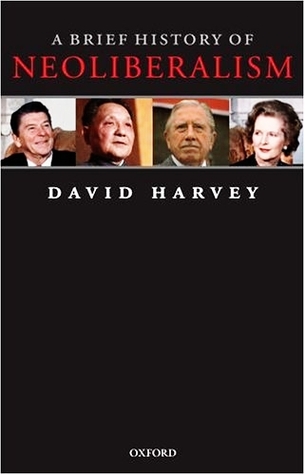More on this book
Community
Kindle Notes & Highlights
Future historians may well look upon the years 1978–80 as a revolutionary turning-point in the world’s social and economic history. In 1978, Deng Xiaoping took the first momentous steps towards the liberalization of a communist-ruled economy in a country that accounted for a fifth of the world’s population. The path that Deng defined was to transform China in two decades from a closed backwater to an open centre of capitalist dynamism with sustained growth rates unparalleled in human history. On the other side of the Pacific, and in quite different circumstances, a relatively obscure (but now
...more
This highlight has been truncated due to consecutive passage length restrictions.
Neoliberalism is in the first instance a theory of political economic practices that proposes that human well-being can best be advanced by liberating individual entrepreneurial freedoms and skills within an institutional framework characterized by strong private property rights, free markets, and free trade.
Neoliberalism has, in short, become hegemonic as a mode of discourse. It has pervasive effects on ways of thought to the point where it has become incorporated into the common-sense way many of us interpret, live in, and understand the world.
The founding figures of neoliberal thought took political ideals of human dignity and individual freedom as fundamental, as ‘the central values of civilization’.
The assumption that individual freedoms are guaranteed by freedom of the market and of trade is a cardinal feature of neoliberal thinking, and it has long dominated the US stance towards the rest of the world.
the evidence strongly suggests that the neoliberal turn is in some way and to some degree associated with the restoration or reconstruction of the power of economic elites.
We can, therefore, interpret neoliberalization either as a utopian project to realize a theoretical design for the reorganization of international capitalism or as a political project to re-establish the conditions for capital accumulation and to restore the power of economic elites.
Neoliberalism as a potential antidote to threats to the capitalist social order and as a solution to capitalism’s ills had long been lurking in the wings of public policy. A small and exclusive group of passionate advocates—mainly academic economists, historians, and philosophers—had gathered together around the renowned Austrian political philosopher Friedrich von Hayek to create the Mont Pelerin Society (named after the Swiss spa where they first met) in 1947 (the notables included Ludvig von Mises, the economist Milton Friedman, and even, for a time, the noted philosopher Karl Popper).
Neoliberal theory gained in academic respectability by the award of the Nobel Prize in economics to Hayek in 1974 and Friedman in 1976. This particular prize, though it assumed the aura of Nobel, had nothing to do with the other prizes and was under the tight control of Sweden’s banking elite.
For example, the CIA engineered the coup that overthrew the democratically elected Mosaddeq government in Iran in 1953 and installed the Shah of Iran, who gave the oil contracts to US companies (and did not return the assets to the British companies that Mossadeq had nationalized). The shah also became one of the key guardians of US interests in the Middle Eastern oil region.
To presume that markets and market signals can best determine all allocative decisions is to presume that everything can in principle be treated as a commodity. Commodification presumes the existence of property rights over processes, things, and social relations, that a price can be put on them, and that they can be traded subject to legal contract. The market is presumed to work as an appropriate guide—an ethic—for all human action. In practice, of course, every society sets some bounds on where commodification begins and ends.
For at the heart of liberal and neoliberal theory lies the necessity of constructing coherent markets for land, labour, and money, and these, as Karl Polanyi pointed out, ‘are obviously not commodities… the commodity description of labour, land, and money is entirely fictitious’. While capitalism cannot function without such fictions, it does untold damage if it fails to acknowledge the complex realities behind them.


